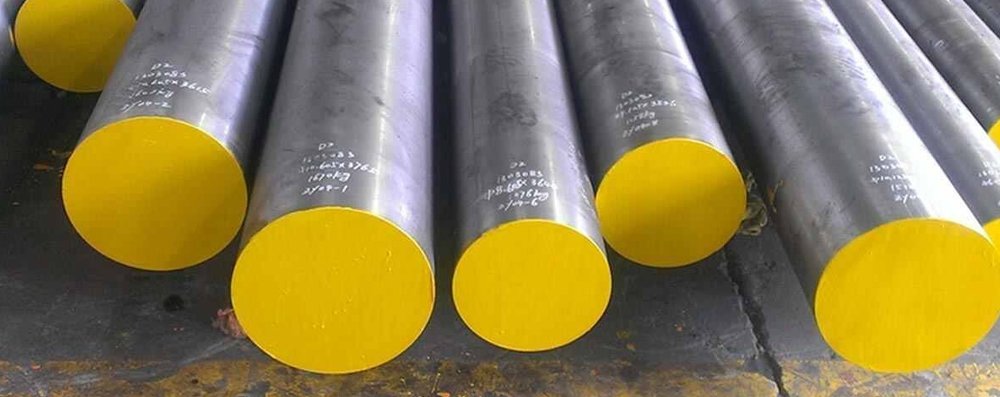Introduction
40C8 is a medium-carbon steel grade that offers a good balance of strength, toughness, and wear resistance. It is often used in applications where moderate strength is required along with the ability to withstand wear and fatigue. This grade is commonly used in manufacturing mechanical components such as shafts, gears, and bolts. Due to its excellent machinability and response to heat treatment, 40C8 can be adapted for use in a wide variety of industries.
Properties of 40C8 Grade:
- Medium carbon steel with a good balance of hardness, strength, and toughness.
- Good machinability when annealed or normalized.
- Excellent weldability and moderate hardenability when heat treated.
- Good fatigue resistance for components subjected to cyclic loads.
- Moderate wear resistance, suitable for medium-duty parts in machinery.
- Used in shafts, gears, and general engineering parts
- Balanced toughness and ductility
Uses/Applications of 40C8 Grade:
- Shafts: Used for manufacturing shafts that require strength and durability.
- Gears: Suitable for medium-duty gears where wear resistance is important.
- Crankshafts: Commonly used in automotive applications for crankshafts.
- Bolts and Nuts: High-strength bolts and nuts for heavy-duty machinery.
- Pins: Pins used in mechanical systems requiring moderate strength.
- Machine Parts: Various other mechanical components that require moderate strength and wear resistance.
- Axles: Suitable for automotive axles and other high-stress components.
Chemical Composition (Typical)
| Element | Content (%) |
| Carbon (C) | 0.37 – 0.44 |
| Manganese (Mn) | 0.60 – 0.90 |
| Silicon (Si) | 0.10 – 0.35 |
| Sulfur (S) | ≤ 0.05 |
| Phosphorus (P) | ≤ 0.05 |
| Iron (Fe) | Balance |
Mechanical Properties (Typical in Normalized Condition):
| Property | Value |
| Tensile Strength | 600 – 700 MPa |
| Yield Strength | 350 MPa min |
| Elongation (in 50 mm) | 16% min |
| Impact Strength (Charpy V-notch) | 40 J min |
| Hardness (Brinell) | 170 – 230 HB |
| Hardness (After Hardening and Tempering) | 290 – 320 HB |
Physical Properties:
| Property | Value |
| Density | 7.85 g/cm³ |
| Modulus of Elasticity | ~205 GPa |
| Thermal Conductivity | ~50 W/m·K |
| Specific Heat Capacity | ~480 J/kg·K |
| Electrical Resistivity | ~0.16 µΩ·m |
Forging:
- Forging Temperature Range: 950°C – 1200°C.
- It is essential to forge at 1100°C – 1200°C for optimal results.
- Do not forge below 850°C to avoid embrittlement of the steel.
- Cooling should be done slowly after forging to maintain material integrity and reduce internal stresses.
Heat Treatment:
- Annealing: Heat to 680°C – 700°C, hold for adequate time, then cool slowly to enhance machinability and relieve internal stresses.
- Normalizing: Heat to 820°C – 880°C, air cool to refine the grain structure and improve toughness.
- Hardening: Heat to 830°C – 860°C, followed by quenching in oil or water, depending on part thickness and desired hardness.
- Tempering: After hardening, temper at 550°C – 650°C to achieve the desired combination of hardness and toughness.
Dimensional Tolerances:
- Hot Rolled Bars: Conforming to BS 970 or equivalent standards, with general tolerances.
- Cold Drawn Bars: Provides tighter tolerances suitable for precision applications.
- Forged Bars: Custom tolerances can be provided for specific client needs.
- Tolerances for straightness, roundness, and flatness are available as per customer specifications.
Machinability:
- Good machinability in the normalized or annealed condition, making it easy to turn, mill, drill, and machine.
- When hardened, C40 steel may require carbide tooling or coated tools for machining.
- Cutting fluids should be used for optimal surface finish and tool life during machining.
Corrosion Resistance:
- Moderate corrosion resistance. 40C8 carbon steel does not have inherent resistance to corrosion, making it susceptible to rust in humid or outdoor environments.
- Protective coatings such as oiling, galvanizing, or painting are recommended for corrosion protection, especially for outdoor applications.
Weldability:
- Good weldability in the annealed or normalized state.
- For welding, preheating to 150°C – 250°C is recommended to avoid cracking in thicker sections.
- Use low-hydrogen electrodes and appropriate filler materials to ensure high-quality welds.
- Post-weld heat treatment may be required to relieve stresses and restore mechanical properties in welded areas.
Available Form:
- Hot Rolled Bars
- Cold Drawn Bars
- Precision Ground Bars
- Forged Bars
- Flat Bars
- Custom shapes and sizes available on request.
- Supplied in normalized, annealed, or quenched and tempered conditions for various applications.
Conclusion:
40C8 Carbon Steel is a versatile medium-carbon steel suitable for a wide range of applications requiring moderate strength and wear resistance. It offers good machinability and excellent hardenability when subjected to heat treatment. Although it is prone to corrosion in untreated form, proper coatings and treatments can significantly improve its performance in aggressive environments. Its use in critical mechanical components like shafts, gears, and axles showcases its strength and reliability for both automotive and industrial applications.
Related Products :20C8, ASTM A36, 20MN2, 55C8, 40C8, C45, ASTM SA-105, C50, C20, C55, EN3B, C55 Mn2, C60, C45, EN9, EN8, EN8D, IS 2062, EN43B, S355J2G3, S40C, SAE 1010, SAE 1018, ST52.3, 20MN2, Maps


